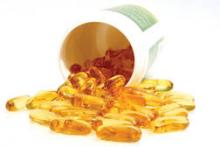Fish oil supplements raised the rate of remission of rheumatoid arthritis when added to background therapy with disease-modifying antirheumatic drugs in a double-blind, randomized controlled trial of patients with recent-onset disease who previously had not taken DMARDs.
Adjuvant fish oil also reduced the use of nonsteroidal anti-inflammatory drugs (NSAIDs) in the trial, said Dr. Susanna M. Proudman of the rheumatology unit, Royal Adelaide (Australia) Hospital, and her associates (Ann. Rheum. Dis. 2013 Sept. 30 [doi:10.1136/annrheumdis-2013-204145]) .
"It can be presumed that fish oil added to this ... treatment regimen will at least delay progression to biological therapy, and the effects may even exceed this minimal expectation," they wrote.
As a side benefit, fish oil also may exert important cardiovascular effects in rheumatoid arthritis (RA) patients, who are at increased cardiovascular risk and have almost twice the risk of sudden cardiac death as the general population, Dr. Proudman and her colleagues noted.
The investigators assessed consecutive patients presenting to the early arthritis clinic at the hospital, all of whom were started on standard, treat-to-target triple-DMARD therapy (methotrexate plus folic acid, sulfasalazine, and hydroxychloroquine) and had RA for less than 1 year. The combination treatment was adjusted individually according to each patient’s treatment response and tolerance of adverse effects.
A total of 139 patients were assigned in a double-blind fashion to receive 10 mL/day of fish oil concentrate that provided 5.5 g/day of the omega-3 fatty acids eicosapentaenoic acid (EPA) and docosahexaenoic acid (DHA) or 10 mL/day of a 2:1 ratio of sunola oil and capelin oil that provided 400 mg/day EPA and DHA. The control group’s mixture contained only enough fish oil to impart a camouflaging "fishy" odor.
The participants were discouraged from using NSAIDs or corticosteroids during the study.
Patients were assessed every 3 weeks for 3 months, then every 6 weeks thereafter for the 1-year duration of the trial.
The primary outcome measure was the failure of triple-DMARD therapy to control disease activity, as evidenced by progression to leflunomide treatment or biologic agents. The investigators noted that the level of disease activity at which drug dosing was escalated was equivalent to a 28-joint Disease Activity Score of 3.2. This rate was only 10.5% (9 of 86 patients) in the fish oil group, compared with 32.1% (17 of 53 patients) in the control group.
Only one study subject, a member of the control group, progressed from leflunomide to biologic agents.
In addition to a lower rate of triple-DMARD therapy failure, subjects in the active-treatment group were significantly more likely to reach RA remission, as measured by American College of Rheumatology criteria, than were those in the control group (hazard ratio, 2.09). They also were nearly twice as likely to discontinue the use of NSAIDS within 12 weeks of baseline, the investigators said.
However, there were no significant differences between the two study groups in scores on a measure of activities of daily living, the rate of using oral or parenteral steroids, the cumulative dose of steroids, or the mean dose of methotrexate.
The proportion of patients who reported an adverse event or a serious adverse event was similar between the two study groups, and there was no pattern of events suggesting any linkage with the fish oil supplements, Dr. Proudman and her associates said.
This study was supported by the National Health Medical Research Council of Australia, the Royal Adelaide Hospital Research Committee, and Melrose Health. No relevant financial disclosures were reported.


